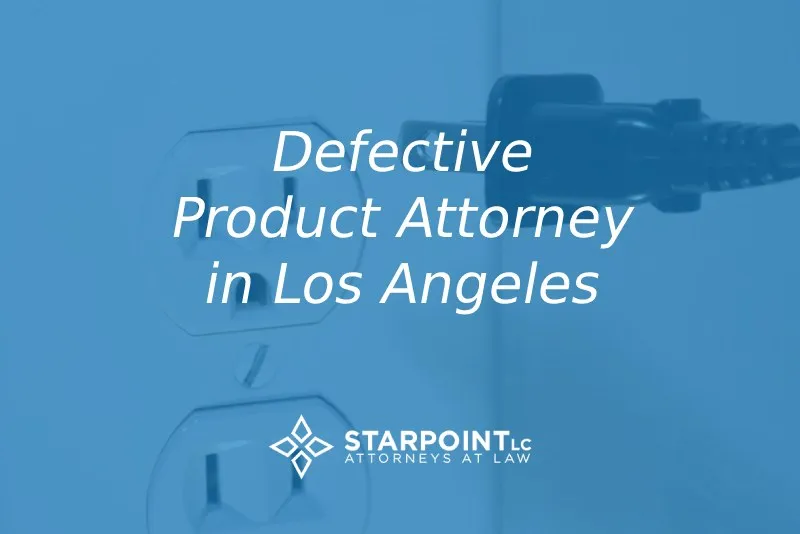Defective Product Attorney in Los Angeles
Have questions or need assistance? Our experienced legal team is just a message or call away. Contact us to discuss your case confidentially and get the trusted guidance you deserve.
5 min read
.webp)

Learn How a Los Angeles Product Liability Lawyer Can Help

When you buy a product, you expect it to work how it is supposed to.
After all, many people decide to purchase a product after seeing an advertisement or watching someone else use it.
So what happens if you buy the product, but it does not function the way you expected?
This is known as a product defect. Defects can arise in several different ways and range in their level of risk.
Some defective products can cause fires and explosions, while others can lack necessary safety features or warnings.
If you or a loved one suffered injuries due to a defective product, you should consult with a dangerous products attorney immediately.
Contact a Los Angeles product liability lawyer at Starpoint Law today to discuss your case.
What Is a Defective Product?
Manufacturers and producers owe consumers an obligation to develop and produce safe items.
When a customer gets hurt due to a product malfunction, the victim can recover damages from the party or parties liable for their harm.
Products can malfunction in several different ways and for many different reasons. We will discuss the types of defective product lawsuits in more detail below.
Product Liability Statistics
According to the National Safety Council, consumer product-related injuries increased by 7% in 2021, following an 18% drop in injuries during 2020.
Product-related injuries usually involve everyday household products, things we assume are safe to use.
It’s also noteworthy that many product-related injuries strike vulnerable populations, like older adults and young children.
Common products that cause injuries include televisions, household cleaning products, and beds.
How Will I Know a Product is Defective?
Sometimes, product distributors will issue a recall for a defective product. The Consumer Protection Safety Commission keeps an updated list of recalled products, safety education materials, and news releases so you can stay informed about any of your products that are defective.
Who Is Liable for Injuries Caused by a Defective Product?
In most cases, the manufacturer is liable for any injuries caused by a defective product.
Manufacturers design and build their products, so they are typically in the best position to understand any potential defects a product has.
However, other parties within the distribution chain may also be liable for your damages, including:
- Product distributors,
- Wholesalers,
- Retailers, or
- Parties responsible for assembly or installation of a product.
Your product liability lawyer can help you ascertain where in the distribution process the defect occurred and which party you should sue for compensation.
Types of Product Liability Claims
The most common defects in products include: (1) design defects, (2) manufacturing defects, and (3) warning or label defects.
Design Defects
A design defect occurs when the intended design of a product poses a foreseeable risk to consumers when it is used for its intended purpose.
To prove the existence of a design defect, you need to show that the risk posed by the product could have been reduced or avoided by adopting a reasonable alternative design.
A “reasonable alternative” means the new design:
- Is possible for the manufacturer to produce,
- Does not impose an undue hardship on the manufacturer due to the cost, and
- Does not conflict with the product’s intended purpose.
When a design defect occurs, the entire line of products is considered defective.
Manufacturing Defects
A manufacturing defect occurs during the manufacturing process for the product.
In this case, the design itself does not contain a defect, but a flaw during the manufacturing process made certain products dangerous and defective.
Unlike a design defect, a manufacturing defect does not affect the entire inventory of products.
Common manufacturing defects include faulty hardware, contaminated food products, or inoperable mechanisms.
Manufacturers are responsible for ensuring their products are safe before sending them to wholesalers and distributors.
As consumers, we trust that a product is only available for sale if it is safe to use.
If a manufacturing defect results in an injury to you or a loved one, contact one of our Los Angeles product liability lawyers right away.
Inadequate Warnings
Inadequate or insufficient warning defects sometimes referred to as marketing defects, mean that the manufacturer failed to warn consumers about risks associated with the product.
All products must have clear and complete warnings about any dangers that are not immediately apparent.
For example, many prescription medications include warnings about potential side effects and prohibited drug combinations.
If you suffered an injury using a product without an adequate warning label, you could qualify to bring a product liability claim.
Strict Liability in Product Liability Claims
When you file a defective product lawsuit, you do not need to prove that the defendant was negligent.
Instead, it is presumed that the manufacturer of the product made a mistake if you suffered an injury after using a defective product.
They are strictly liable for any damages you suffer as a result of the defective product.
Strict liability is a legal concept that is tricky to comprehend, even for a seasoned attorney.
Contact one of our product liability lawyers in Los Angeles to discuss what this means for your case.
Contact a Los Angeles Product Liability Lawyer at Starpoint Law Today
If you or a loved one suffered an injury due to a defective product, do not hesitate to reach out to Starpoint Law.
When you reach out to our law firm, we offer personalized, one-on-one service. We will fight aggressively to ensure you obtain the compensation you deserve.
Additionally, we will make sure you know what is going on with your case every step of the way. Our clients are more than just a number to us.
We know that you are going through a stressful and likely frustrating experience. Let us put our legal expertise to work for you.
Reach out to our office today to start your initial one-on-one consultation. We are ready to listen and, most importantly, ready to help.
Contact Us
You Don’t Have to Figure This Out Alone.
Whether you were injured or mistreated at work, we’ll explain your options clearly — and guide you through every step. No fees up front. No pressure. Just answers.




